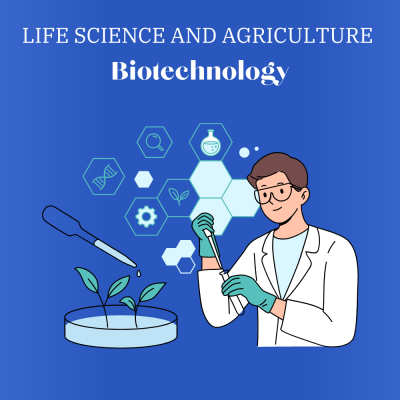

Biotechnology
Biotechnology is a vast and interdisciplinary field that uses biology, chemistry, physics, and engineering principles to control living creatures or their components in order to create products and technologies that benefit both humans and the environment. It has numerous uses, including genetic engineering, molecular biology, medicines, agriculture, environmental remediation, and industrial operations. Biotechnologists use techniques including genetic engineering, fermentation, and tissue culture to genetically change organisms, create novel chemicals, develop diagnostic tools, and construct biological systems for specialised applications. Biotechnology has enabled important advances in medicine, including the creation of vaccines, gene treatments, and personalised medical techniques. In agriculture, biotechnology has enabled the development of genetically engineered crops with improved features such as insect resistance and productivity.
University
40+
Duration
3 to 4 years
Eligibility
Intermediate
Biotechnology Course in India
Biological sciences, engineering, and technology are combined in the multidisciplinary field of biotechnology to create goods and services for a range of sectors. Biotechnology has become a burgeoning field of study and research in India, with several chances for postgraduate education.
Undergraduate Level:
Students can specialise in biotechnology and earn a Bachelor of Science (B.Sc.) degree at the undergraduate level. This programme lasts for three years on average. The curriculum includes specialised courses in biotechnology together with basic concepts in engineering, chemistry, and biology. Important subjects consist of:
- Cell Biology and Genetics
- Microbiology
- Molecular Biology
- Biochemistry
- Bioprocess Engineering
- Immunology
- Genetic Engineering
- Biostatistics and Bioinformatics
An essential part of the undergraduate curriculum is practical instruction and laboratory work, which gives students firsthand exposure with procedures like DNA modification, protein purification, and fermentation processes.
Postgraduate Level:
Numerous universities and other educational establishments around India offer Master of Science (M.Sc.) programmes in Biotechnology for individuals pursuing higher education. The M.Sc. programme lasts for two years on average. Postgraduate research delves further into specific fields within biotechnology, such as:
- Advanced Genetic Engineering
- Bioprocess Technology
- Pharmaceutical Biotechnology
- Agricultural Biotechnology
- Environmental Biotechnology
- Industrial Biotechnology
- Bioinformatics and Computational Biology
M.Sc. programmes frequently contain research projects or dissertations in addition to coursework, enabling students to contribute to ongoing study in the field.
Doctoral Level:
Biotechnology doctoral programmes (Ph.D.) are available for those who want to work in academia or conduct research. Ph.D. candidates do cutting-edge research while working with seasoned academics on certain biotechnology-related issues. Research topics could consist of:
- Protein Engineering and Biocatalysis
- Stem Cell Biology and Regenerative Medicine
- Bioprocess Optimization and Scale-up
- Synthetic Biology and Metabolic Engineering
- Bioinformatics and Systems Biology
- Bioremediation and Waste Management
Three to five years are usually allotted for Ph.D. programmes, during which time students must perform original research and submit their findings to peer-reviewed publications.
Career Opportunities:
Indian biotechnology programme graduates can pursue a variety of careers in a range of industries, including:
- Biopharmaceutical Industry
- Agricultural Biotechnology Companies
- Environmental Biotechnology Firms
- Food and Beverage Industry
- Healthcare and Clinical Research Organizations
- Academic and Research Institutions
- Government Agencies and Regulatory Bodies
In general, biotechnology education in India gives graduates the information and abilities needed for jobs in R&D and innovation, advancing the fields of environmental sustainability, healthcare, and agriculture.










Right Location, Affordable Fees And Right Education!

